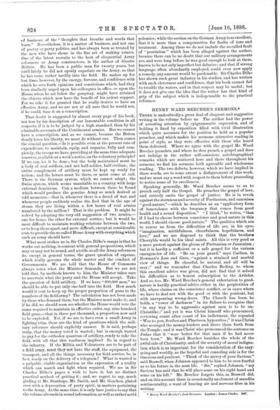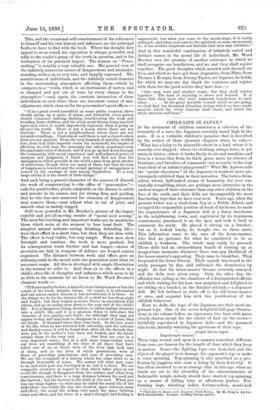HENRY WARD BEECHER'S SERMONS.*
THERE is undoubtedly a great deal of eloquent and suggestive writing in the volume before us. The author had the power of arresting attention by epigrammatic expression, and of holding it fixed by exposition filled with vivid illustration which quite accounts for the position he held as a popular preacher, and which makes his sermons attractive reading in point of style, as they were effective with those who heard them delivered. Where we agree with the gospel Mr. Ward Beecher preaches, and where he does preach a gospel and does not indulge in the rather self-conscious autobiographical remarks which are scattered here and there throughout his sermons, we find his sermons both agreeable and wholesome reading. The two defects, however, which we have implied in these words, are to some extent a disfigurement of this work, and we must say a word with respect to them before proceeding to notice some of its excellences.
Speaking generally, Mr. Ward Beecher seems to us to preach only half the Gospel. He preaches the gospel of love, and entirely omits the gospel of justice. He is in revolt against the sternness and severity of Puritanism, and canonises "good-nature,"—which he describes as an " applicatory form of benevolence with the buoyancy that comes from good health and a sound disposition." "I think," he writes, "that if I had to choose between conscience and good-nature in this world, I should choose good-nature." The qualities which are to rescue us from the difficulties of life are, in his eyes, " imagination, mirthfulness, cheerfulness, hopefulness, and love ;" and we are disposed to think that the brothers Cheeryble would be his ideal saints. All this is very good as a mere protest against the gloom of Puritanism or Jansenism; but it is hardly a sufficient or a safe gospel for the various emergencies of life. "Be on your guard," says Carlton, in Newman's Loss and Gain, "against a strained and morbid view of things. Be cheerful, be natural, and all will be easy;" and we remember that Charles Reding, to whom this excellent advice was given, did not find that it solved his difficulties as to honest subscription to the Articles. And so, too, Mr. Ward Beecher's general exhortation to good. nature is hardly practical advice either in the perplexities of life, where claims on the conscience conflict, or in cases where we have to deal not with the good or with the penitent, but with unrepenting wrong-doers. The Church has been, he holds, a "tower of darkness" in its failure to recognise that "in any way to be aggressive against men is to be un- Christlike ;" and yet it was Christ himself who pronounced, reviewing count after count of his indictment, the repeated "Woe to you, Scribes and Pharisees, hypocrites ;" it was Christ who scourged the money-lenders and drove them forth from the Temple ; and it was Christ who pronounced the sentence on Judas that it "were better for that man if he had never been born." Mr. Ward Beecher banishes the whole of the awful side of Christianity, and of the severity of moral indigna- tion which is as important for the consideration of the easy- going and worldly, as the hopeful and consoling side is for the timorous and penitent. "Think of the mercy of your Saviour," said Boswell, when Johnson appeared to him to be over-fearful as to his future in the next life. "Sir," replied Johnson, "my Saviour has said that he will place some on his right hand and some on his left." Mr. Beecher forgets this, as Boswell did, and on this account there is occasionally an element of maudlin sentimentality, a want of bracing air and nervous fibre in his writing.
'" Henry Ward Beecher's Last Sermons. London James Clarke. 1887. This, and the occasional self-consciousness of his references to himself and his own history and influence, are the principal faults we have to find with the book. Where his thought does appeal to us as sound, his exposition is always powerful, and adds to the reader's grasp of the truth in question, and to his realisation of its practical import. The sermon on " Peace- making " is notably a very valuable one. His general view of the infinitely numerous causes of disagreement and misunder- standing strikes us as very true and happily expressed. The sensitiveness of individuals, and the infinitely varied elements in the surrounding atmosphere affecting them—which he compares to a "violin, which is an instrument of nerves, and is changed and put out of tune by every change in the atmosphere "—and, again, the constant interaction of these individuals on each other, these are incessant causes of mis- adjustment, which clamour for the peacemaker's good offices :— "If in a great crowd assembled on some public occasion, there should spring up a panic of alarm, and forthwith every person should commence rushing, dashing, overthrowing the weak and treading down children, and the whole great throng doing mischief upon each other, it would imperfectly represent what is going on all over the world. There is not a house where there are not frictions. There is not a neighbourhood where there are not misunderstandings. I had almost said there is not a church where there are not quarrels. From the very fountain of sanctity, wedded love, from that little imperial realm the household, the empire of affection, we still hear the murmurs, the outcry, sometimes even the passionate cries of discord; and if you go up and down through the community with moral experience and well-adjusted power of analysis and judgment, I think you will find not that the unhappiness which prevails in the world comes from great strokes of misfortune, though there are many of these, but that the tone of happiness is lowered and the actual uprising of unhappiness is caused by the carriage of men among themselves. To a very large extent it is the result of little things."
And such being a general character of the sources of discord, the work of counteracting it—the office of "peacemaker "- calls for qualities fine, pliant, adaptable, as the disease is subtle and minute in its causes, and yet strong, firm, and guiding, that he who has once mastered the elements of disagreement may remove them,—may adjust what is out of joint, and smooth what is unduly rugged.
Still more powerful is Mr. Beecher's picture of the imper- ceptible and yet all-moving results of "moral seed sowing." The most far-reaching and important works are, he maintains, those which seem at the moment to bear least fruit. The simplest animal actions—eating, drinking, defending life— have their effect in a short time, but then they are done with. 'The effect is very visible, but very simple. When men show foresight and combine, the work is more gradual, but its consequences reach further and last longer,—stores of provision are laid in, weapons of defence are forged, armies organised. The distance between work and effect goes on widening until in the moral scale one generation sows what its successor reaps. All this is developed with ample illustration in the sermon we refer to. And then, as to the effects in a child's after-life of thoughts and influences which seem to do so little at the moment, let us listen to Mr. Ward Beecher's eloquent words :-- "If Homeopathy be true, a drop of colour changes more or less the colour of the whole Atlantic Ocean. Of course, it is attenuated and our senses cannot discern it, but nevertheless it is there. So the things we do for the interior life of a child we lose from sight and forget; but they remain as active forces in association with others, and go on acting clear down to the very end of the child's life. It is a dangerous thing, therefore, to infuse malign elements into a child's life, and it is a glorious thing to introduce the elements of love, purity, and truth ; for although they may not appear to-day, and may seem to disappear in a score of years, they are latent. A thousand times they come back. In the last years of his life, when he has wrestled with adversity, and the outcome and finality comes, it will be found that, after all, the threads that were put in the mother's love have not broken, and the fabric retains them to the very end Our lives are ours in a very important sense; but in a still more transcendent sense ur lives are something of the lives of all those that have taken care of us, as theirs were of the lives that took care of them, and as the lives of whole generations were of those of preceding generations, and eras of preceding eras. We are the receptacle of a history which has come down to us through thousands of years. We cannot tell what part came to us, and what part was developed in us ; but it is there. We are composite creatures in regard to that which takes place in our social life, though it disappears from the surface, and often from consciousness, and there is a long distance between the seed and the harvest ; but the harvest is the child of the seed. When you rise one stage higher—to what may be called the moral life of the individual—the bodily life has the shortest space between cause and effect; the social life widens very much the space between cause and effect, and the force of a man's thought and feeling is
augmented ; but when you come to the moral stage, it is vastly enlarged ; and when you come to the spiritual, no man can measure it ; it has neither longitude nor latitude that men may calculate."
And in this wonderful combination of infinitely varied and distinct causes in the moral life of individuals, Mr. Ward Beecher sees the promise of another existence in which we shall recognise our benefactors, and we and they shall rejoice together. The good thoughts which mended and cheered our lives, and which we have got from Augustine, from Plato, from Thomas A. Kempis, from Jeremy Taylor, are legacies, he holds, for which we may one day thank the testators, and rejoice with them for the good service they have done :— " One man sows and another reaps ; but they shall rejoice together. The land of rejoicing is above and beyond. It is there that they meet who were unknown benefactors to each
other In the great invisible toward which we are going, we shall find ten thousand vibrating strings which we have made musical, which the whole heavens shall chant, and which the whole universe will hear."



































 Previous page
Previous page